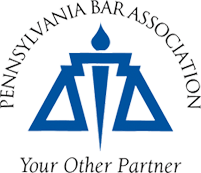� Oliver Brown�s Daughters Featured Speakers �
HARRISBURG (May 7, 2004) � The Pennsylvania Bar Association (PBA) today launched Pennsylvania�s fifth annual statewide Law Day program with a special luncheon to commemorate the fiftieth anniversary of the landmark U.S. Supreme Court ruling in Brown v. Board of Education, which integrated schools across America. Held in Harrisburg, the luncheon featured Oliver Brown�s daughters, Linda and Cheryl, as the keynote speakers. Oliver Brown was the lead plaintiff in the case.
�Each year, the PBA joins in the national celebration of Law Day to honor our American heritage of freedom and equality under the law,� PBA President Thomas M. Golden said. �But this year, our Law Day celebration takes on a new and even more significant meaning as we commemorate the fiftieth anniversary of the Brown v. Board ruling. This ruling on May 17, 1954, forever changed education and civil rights in America. It united our children and our country.�
In 1896, the U.S. Supreme Court ruled in Plessy v. Ferguson that �separate but equal� was acceptable in America � thus ushering in the �Jim Crow� era. Enforced segregation kept black citizens and other people of color from many of the facilities used by white citizens across much of the United States. Public schools, transportation, residential neighborhoods, even public lavatories and drinking fountains were designated for the exclusive use of �whites,� while separate facilities were set aside for �colored people.�
At that time, schools designated for black children were substandard facilities with outdated textbooks and no basic school supplies. And, as states began to erect legal barriers to stop black citizens from voting, any hope of changing these laws through democratic processes was stripped away.
In the early 1950s, the National Association for the Advancement of Colored People (NAACP) assembled a legal team, first led by Charles Houston and later by future U.S. Supreme Court Justice Thurgood Marshall, to file lawsuits against various local school boards across the country on behalf of African-American parents and their children. Oliver Brown and his family were involved in one such case.
In 1952, the U.S. Supreme Court combined five of these cases, and the nearly 200 plaintiffs involved in them, under the heading of Brown v. Board of Education. The combined cases originated in Delaware, Kansas, South Carolina, Virginia and Washington D.C. On May 17, 1954, the Court unanimously ruled:
We conclude that, in the field of public education, the doctrine of �separate but equal� has no place. Separate educational facilities are inherently unequal. Therefore, we hold that the plaintiffs and others similarly situated for whom the actions have been brought are, by reason of the segregation complained of, deprived of the equal protection of the laws guaranteed by the Fourteenth Amendment.
� Decision Issued by Chief Justice Earl Warren
Linda Brown Thompson and Cheryl Brown Henderson are two of the three children of the late Reverend Oliver L. Brown. Committed to preserving the historic legacy of the Brown decision, Linda and Cheryl, along with their mother and sister, established the Brown Foundation for Educational Equity, Excellence and Research. Cheryl is the executive director of the foundation and Linda is the program associate.
As part of the PBA�s celebration, lawyers and judges will visit hundreds of Pennsylvania classrooms throughout the month of May to help children learn about the law and study the impact of the Brown v. Board of Education decision on our country. A new lesson plan guide, which was developed to help with those visits, is provided free-of-charge to schools as well.
For more information about the 2004 Law Day celebration and to view the free lesson plan guide, visit the PBA Web site at www.pabar.org/lawday2004home.asp.
|
